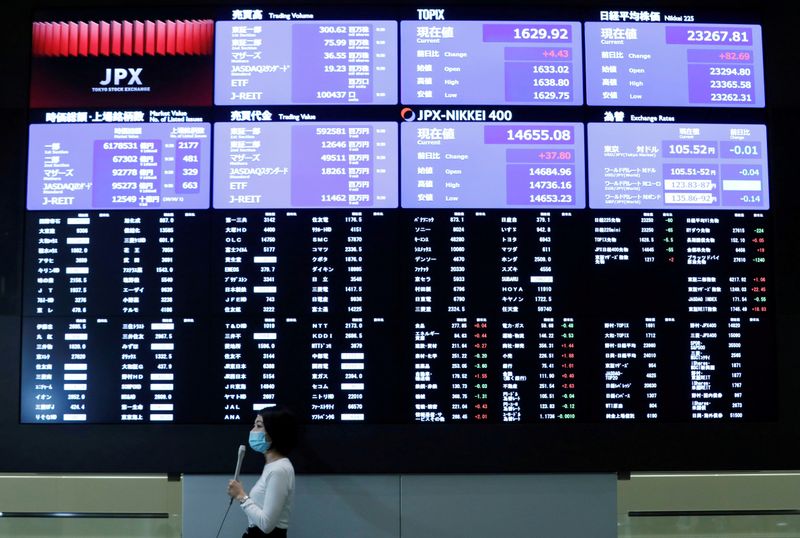By Kane Wu
(Reuters) - Asian stocks fell on Tuesday as investors were unnerved by the soaring global coronavirus cases that dampened the recovery outlook and slow progress on a U.S. stimulus deal.
U.S. shares however were set to bounce back from Wall Street's worst day in a month with E-mini futures for the S&P 500 (ESc1) up 0.23%. London's FTSE futures (FFIc1) edged up 0.02%.
MSCI's gauge of Asia Pacific stocks outside Japan (MIAPJ0000PUS) was down 0.43%, while Australia's ASX 200 (AXJO) closed down 1.7%, in its worst session in a month.
China's CSI300 Index (CSI300) pared morning losses, as investors looked out for any news from a meeting of China's Communist Party leaders to set the next five-year plan.
"Two events in the next few days will shape the policy outlook for the world’s two largest economies: China’s 14th Five-Year Plan and the U.S. elections," said Tai Hui, chief Asia market strategist at J.P. Morgan Asset Management.
"The recent surge in infections in the U.S. and Europe is also denting market sentiment."
Rising coronavirus cases around the world are forcing some countries to impose new curbs, risking derailing any global economic recovery.
Data out earlier also showed China's industrial profits grew at a slower pace in September, suggesting a recovery in the manufacturing sector of the world's second-largest economy has yet to solidify.
In Japan, the benchmark Nikkei 225 (N225) dropped 0.11% while Hong Kong's Hang Seng index (HSI) was down 0.76%.
China's Ant Group <688688.SS>, (HK:6688) will close its Hong Kong institutional book building a day earlier than planned as it aims to raise about $17.2 billion in the city, Reuters reported on Tuesday. The group, controlled by Alibaba (NYSE:BABA) founder Jack Ma, is set to raise up to $34.4 billion in a dual listing in Hong Kong and Shanghai in the world's largest IPO.
U.S. indices fell sharply overnight over the double whammy of record coronavirus cases and political deadlock in negotiations to provide more economic aid.
White House economic adviser Larry Kudlow told reporters on Monday that talks over a coronavirus relief package have slowed, though House Speaker Nancy Pelosi remained hopeful an agreement can be reached before the Nov. 3 elections.
"The challenge for markets is that in most cases they are already pricing a very strong economic bounce. The new outbreaks, and the potential for a double-dip recession, directly contradict this assumption," Michael McCarthy, chief market strategist at CMC Markets in Sydney.
National polls give Democrat Joe Biden a solid lead over president Donald Trump but the contest is much tighter in battleground states that could decide the outcome.
The sharp stock market decline set a bleak tone ahead of a busy third-quarter earnings season, with large U.S. tech firms like Apple Inc (O:AAPL), Amazon.com Inc (O:AMZN) and Google-parent Alphabet Inc (O:GOOGL) set to report. Microsoft Corp (O:MSFT) reports its results Tuesday.
The dollar (=USD) was down 0.153% during the Asia day to trade at 92.932 against a basket of six major currencies.
Much of the trading in currency markets, as well as other asset markets, was buffeted by the renewed coronavirus fears.
Oil prices eked out small gains on Tuesday after recent sharp losses, but sentiment remained subdued as surging global coronavirus cases hit prospects for crude demand while supply is rising. Brent crude (LCOc1) was up 35 cents, or 0.87%, at $40.81 a barrel, having dropped more than 3% overnight. U.S. oil (CLc1) was up 30 cents, or 0.78%, at $38.86 a barrel, after also declining more than 3% on Monday.

The safe-haven Spot gold